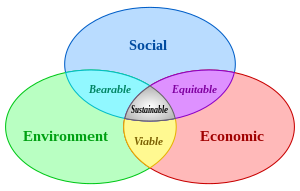What is Sustainability? (13 page pdf, Sustainability 2010, 2(11), 3436-3448, Nov.1, 2010)
The authors of the article under review today tackled a large challenge in examining what “sustainable development” meant when introduced in 1987 by the Brundtland Commission and what it has become in being applied with such concepts as Triple Bottom Line. Indeed, “Sustainable Cities” was considered for the title of this blog but discarded in preference to a clearer “Pollution Free Cities” where the link to sustainability is expected from striving for a city without pollution- a term which, unlike sustainability, is measurable. The other main point made in the article is the lack of priority given to the environment compared to socio-economic trends which also tend to be viewed short term “happiness” as opposed to the long term well being implied in maintaining a high quality environment.
Key Quotes:
“The concept of sustainability was originally coined in forestry, where it means never harvesting more than what the forest yields in new growth.. is a natural topic of study for economists: after all, the scarcity of resources is of central concern to the dismal science”
“two major developments in the concept of sustainability:
- its interpretation in terms of three dimensions, which must be in harmony: social, economic and environmental.
- the distinction between ‘strong’ and ‘weak’ sustainability”
“Sustainability ..was concerned with the tension between the aspirations of mankind towards a better life on the one hand and the limitations imposed by nature on the other hand.. re-interpreted as encompassing three dimensions, namely social, economic and environmental.. obscures the real contradiction which exists between long-term sustainability and short-term welfare.”
“return to the original meaning, where sustainability is concerned with the well-being of future generations and in particular with irreplaceable natural resources—as opposed to the gratification of present needs which we call well-being”
“If ‘sustainability’ is anything more than a slogan or expression of emotion, it must amount to an injunction to preserve productive capacity for the indefinite future”
“Happiness, Well-being and Welfare.. may be used to express a primary goal of government policy: to improve people’s lives”
“view happiness as a basic goal of human behaviour but not of policy.. well-being refers to the objective conditions that help to make people happy..equivalent to ‘livability of the environment’.. Welfare is then a more limited concept denoting prosperity in terms of material needs such as food, water, health, and shelter.
“Sustainability may then be defined as maintaining well-being over a long, perhaps even an indefinite period. This covers largely the environmental dimension of the triple bottom line, but environment and sustainability are not synonymous”
“should pose two questions: what resources should we preserve at all cost, and to what degree?.. Sustainability, then, is a matter of what resources—natural resources, quality of the environment, and capital—we bequeath to coming generations”
Related articles
- So, what is your distinction? (jameswsasongko.wordpress.com)
- America's Beef Producers Participate in Global Conference on Sustainable Beef (prweb.com)
- AEG Sustainability Reporting comes Alive (triplepundit.com)
- Unilever Unveils Plan to Decouple Business Growth from Environmental Impact (eon.businesswire.com)
- Americans Want Environmentally Sustainable Businesses (livescience.com)
- Digital Nirvana: The First Rule of the Triple Bottom Line (whattheythink.com)
- Sustainable Urbanism: Creating Resilient Cities (yuriartibise.com)


Sorry- not interested
ReplyDelete